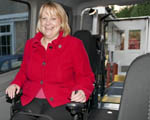 Go to main content
Go to main content
Archive Website of the UK government
Please note that this website has a UK government accesskeys system.
Main menu
Page menu
Disabled people

What to expect from an airport security check

Security searches are carried out on all passengers and baggage before they are allowed to board an aircraft. Disabled people and mobility equipment such as wheelchairs are not exempt from these searches.
Undergoing a security search
It's important to let security staff know about any disability or medical condition you have that may affect the search. This is especially important for any hidden disabilities such as diabetes or learning difficulties.
Let staff know if you are finding any part of the process uncomfortable - for example, if you experience pain when raising your arms.
Security staff should:
- ensure each stage of the process is explained in clear and simple words
- offer the option of a private area to perform the search, if required
- listen and take your needs into consideration and act upon them as best they can
- offer help at any stage of the search if you need it
There will be certain things that the security staff should be aware of when searching people with specific impairments. For example, if you are physically disabled, you should be helped to lift baggage onto and off the X-ray machine.
If you are blind or visually impaired, ask for a witness to be present if your bag is searched. Also, your bag should be re-packed exactly as security staff found it.
Medication
Security staff should handle any medication discreetly and re-pack it carefully.
If you're travelling with any medication or medical supplies you need a letter from your doctor explaining what it is and why you need it. For instance syringes and large amounts of medication.
If you're carrying syringes in your hard luggage and you're not carrying a doctor's letter you're unlikely to be allowed to board the aircraft.
You should also tell the airline in advance if you will be carrying syringes either in your hand luggage or checked-in bags.
 Facebook
Facebook Twitter
Twitter StumbleUpon
StumbleUpon Delicious
Delicious Reddit
Reddit